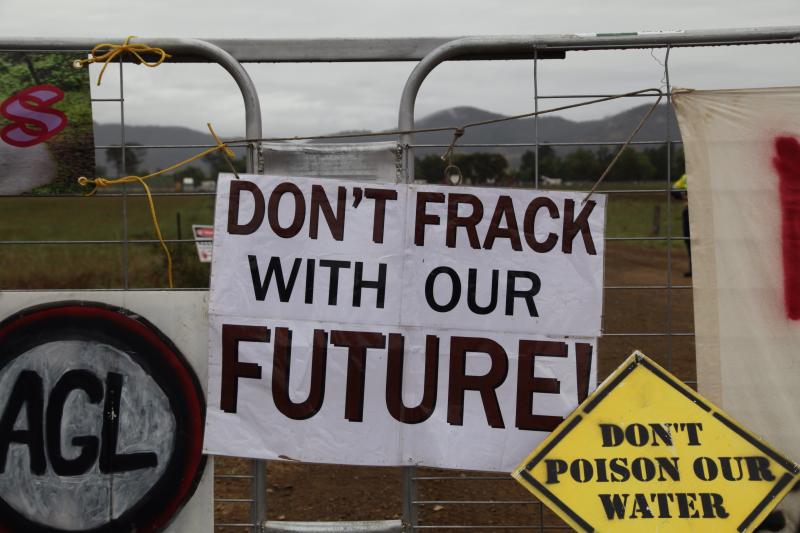
Commission backtracks on fracking advisory group following complaint
Photo: Kate Ausburn on Flickr
The European Commission has excluded all stakeholders from an industry-dominated expert group on fracking following a complaint to the European Ombudsman from Friends of the Earth Europe and Corporate Europe Observatory [1].
The “European Science and Technology Network on Unconventional Hydrocarbon Extraction” was under investigation from the European Ombudsman for bias in favour of the fracking industry, and potential conflicts of interest from all working group chairs [2].
The European Commission consistently refuted the accusations, but has now taken the decision to move the work in-house, shortly before the Ombudsman presents her findings [3]. The decision will take effect after the Annual conference on Tuesday 23 February.
Antoine Simon, shale gas campaigner for Friends of the Earth Europe said: "It’s no coincidence that the European Commission decides to scrap this expert group shortly before the European Ombudsman rules on our claim for malpractice. The fracking ‘Expert group’ was a lobby vehicle for the fracking industry, and its demise is a victory for the environment and the public interest.
Transparency is crucial now that the Commission has taken on the work of assessing the dangers of fracking. Shale gas development is deeply incompatible with tackling climate change, and is in complete contradiction to what little we got from the climate talks in Paris."
Pascoe Sabido, researcher and campaigner at Corporate Europe Observatory said: “Ending fracking industry involvement in the group is surely a victory for the majority of European citizens opposed to the practice. Giving pro-fracking interests four-fifths of the seats, as well all chair and vice-chair positions, was only going to result in pro-industry recommendations. But closing the advisory group to all stake-holders points to a bigger problem: that the Commission simply couldn't rebalance it away from industry.”
Both Friends of the Earth Europe and Corporate Europe Observatory, along with the Ombudsman and European Parliament, have repeatedly pointed to industry dominance in groups advising on everything from taxation to trade, something the European Commission continues to ignore [4].
***
For more information please contact:
Antoine Simon, shale gas campaigner for Friends of the Earth Europe
Tel: +32 (0) 486 685 664 Email: antoine.simon@foeeurope.org
Pascoe Sabido, researcher and campaigner at Corporate Europe Observatory
Tel: Tel: +32 (0) 4 86 85 74 16 Email: pascoe@corporateeurope.org
***
NOTES:
[1] Friends of the Earth Europe, Carte Blanche for Fracking, April 2015: http://www.foeeurope.org/carte-blanche-fracking
Friends of the Earth Europe and Corporate Europe Observatory complaint to the European Ombudsman: https://cloud.foeeurope.org/index.php/s/0wKmTyvrCndi8EK
[2] European Science and Technology Network on Unconventional Hydrocarbon Extraction: https://ec.europa.eu/jrc/en/uh-network
[3] European Commission response to Friends of the Earth Europe and Corporate Europe Observatory claims: https://cloud.foeeurope.org/index.php/s/etH1VQxt6AJ1iw3
Final comments provided by Friends of the Earth Europe and Corporate Europe Observatory: https://cloud.foeeurope.org/index.php/s/45uQo83xWe9hV8s
[4] The Ombudsman opened her own investigation into the Commission's advisory groups, formally called Expert Groups, and has given the Commission until April 30th to respond to her final recommendations, after the Commission refused to address balance after it was raised in her first set of recommendations; the European Parliament has twice frozen the Commission's Expert Group budget, demanding balanced groups, while its Budget Control Committee is currently writing an own initiative report on Expert Groups, highlighting the crucial issue of balance. The Commission is supposed to release new horizontal rules on Expert Groups, but is reported to once more ignore the issue of balance. Civil society groups have written an open letter to the Commission asking for the new rules to be delayed to ensure input from Parliament (via its report) and civil society (via a public consultation).
